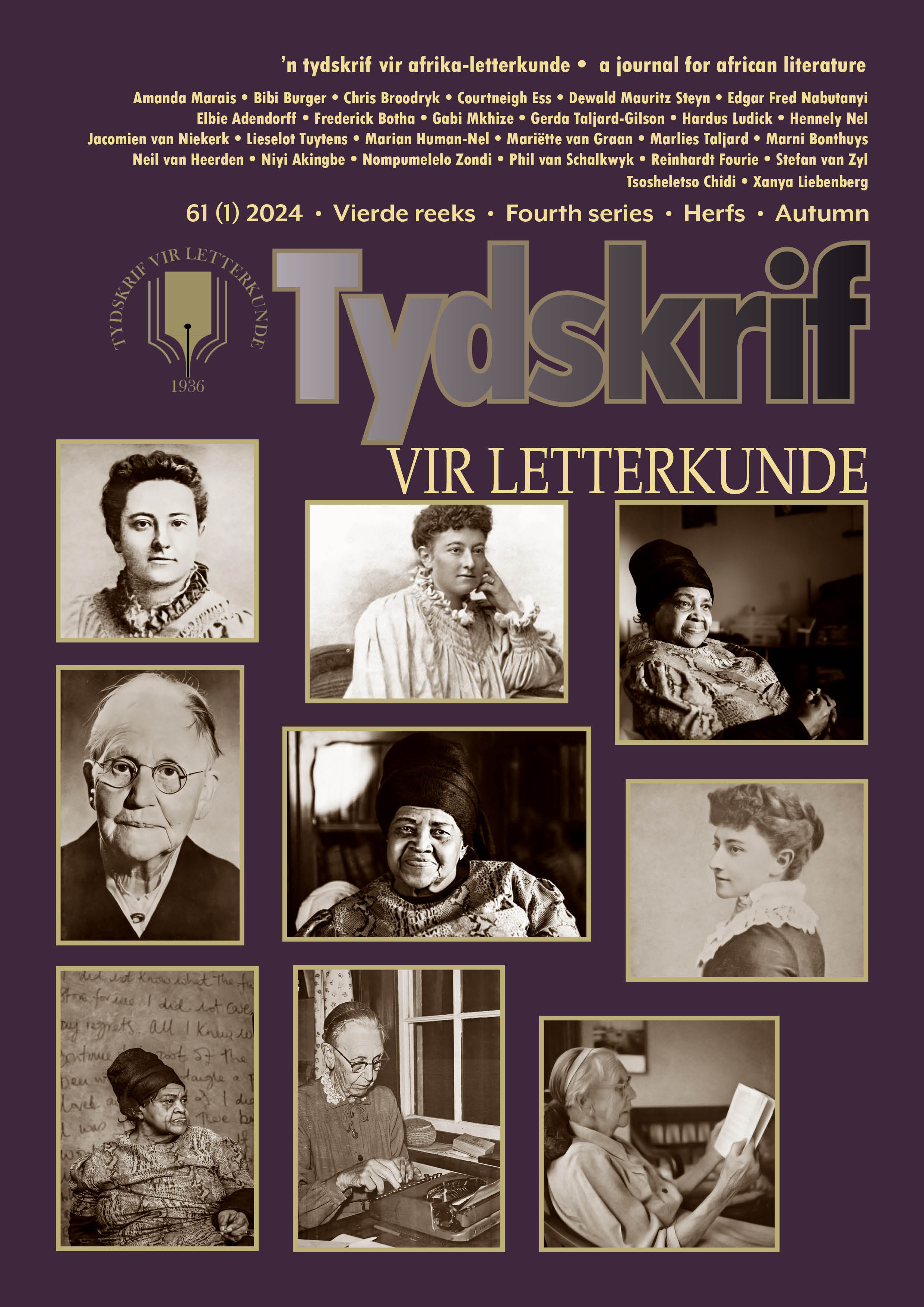Comparative analysis of black queer feminist isiXhosa and English poetry
DOI:
https://doi.org/10.17159/tl.v61i1.16060Keywords:
poetry, queerness, blackness, women, discourse, heteronormativity, heteropatriarchyAbstract
Black queer feminist literature remains under-researched. This reflects the societal marginalisation of black queer authors in South Africa. Our article offers a comparative analysis of the representation of black queer women by black queer and cisgender authors in selected isiXhosa and English poetry. The poems selected are from Unam Wena (2021) by Mthunzikazi Mbungwana and red cotton (2018) by vangile gantsho. Firstly, we explore how queer feminism is captured from a Xhosa perspective. Secondly, we explore how English is used to expose readers to black queerness, and, thirdly, we question how literary scholarship influences or limits black queer feminist literature and the functionality of queer feminist poetry as representations of black women. Discourse theory is used to examine how authors of the selected poetry construct knowledge about black queerness from a feminist perspective and shape how people understand it. In this article we adopt a narrative enquiry within the constructionism paradigm with qualitative textual analysis. Our analysis of the poetry reveals that, although the selected poets use two different languages, the same protest voice is foregrounded, with observable differences being primarily technical—namely how form, sound, and structure are employed to set the tone and mood in the issues addressed.
Downloads
References
Andrews, Grant. “The emergence of black queer characters in three post-apartheid novels.” Tydskrif vir Letterkunde vol. 52, no. 2, 2019, pp. 1–9. DOI: https://doi.org/10.17159/2309-9070/tvl.v.56i2.5843. DOI: https://doi.org/10.17159/2309-9070/tvl.v.56i2.5843
Audre, Lorde. Sister outsider: Essays and speeches. Crossing, 1984.
Chitando, Anna. “Writing Mother Africa. African Women Creative Writers and the Environment.” Journal of African Languages and Literary Studies vol. 1, no. 2, 2020, pp. 61–85. https://hdl.handle.net/10520/EJC-1f269ff3c7. DOI: https://doi.org/10.31920/2633-2116/2020/1n2a4
Gaber, Linda. Identity Poetics Race, Class, and the Lesbian-Feminist Roots of Queer Theory. Columbia U P, 2001. gantsho, vangile. red cotton. Impepho, 2018. DOI: https://doi.org/10.7312/garb11032
Gyamerah, Akua O. et al. “Sexuality Disclosure Among Black South African MSM and Responses by Family.” Journal of Sex Research vol. 56, no. 9, 2019, pp. 1203–18. DOI: https://doi.org/10.1080/00224499.2018.1559917. DOI: https://doi.org/10.1080/00224499.2018.1559917
Habib, Samar. Queer Names and Identity Politics in the Arab World Various terms used for same-sex sexuality in Arabic, and their implications for sexual identities. Global Encyclopedia of Lesbian, Gay, Bisexual, Transgender, and Queer History. Charles Scribner’s Sons, 2021.
Qhali, Itumeleng. Loss-Ilahleko: a national Choreopoem. Kairos Ark, 2021.
Laclau, Ernesto & Chantal Mouffe. Hegemony and socialist strategy: Towards a radical democratic politics. Verso, 2014.
Macheso, Wesley Paul. “Fiction as Prosthesis: Reading the Contemporary African Queer Short Story.” Tydskrif vir Letterkunde vol. 58, no. 2, 2021, pp. 8–17. DOI: https://doi.org/10.17159/tl.v58i2.8633. DOI: https://doi.org/10.17159/tl.v58i2.8633
Matolino, Bernard. “Being Gay and African: A View From an African Philosopher.” Phronimon vol. 18, 2017, pp. 59–78. DOI: https://doi.org/10.25159/2413-3086/2056. DOI: https://doi.org/10.25159/2413-3086/2056
Mbungwana, Mthunzikazi. Unam Wena. Uhlanga, 2021.
Molebatsi, Natalia. “Affirming our memories: Experiences and realities of feminist poets through the radio.” Agenda vol. 33, no. 2, 2019, pp. 84–94. DOI: https://doi.org/10.1080/10130950.2019.1618638. DOI: https://doi.org/10.1080/10130950.2019.1618638
Moopi, Peter & Rodwell Makombe. “Coloniality and Identity in Kopano Matlwa’s Coconut (2007).” Critique: Studies in Contemporary Fiction vol. 63, no. 1, 2022, pp. 2–13. DOI: https://doi.org/10.1080/00111619.2020.1798335. DOI: https://doi.org/10.1080/00111619.2020.1798335
Mvune, Mornica Nozipho. “Gender, culture and sexuality: teenage pregnancy in rural KwaZulu-Natal.” MA Thesis. U KwaZulu-Natal, 2013.
Sandfort, Theo & Vasu Reddy. “African same-sex sexualities and gender-diversity: an introduction.” Culture, Health & Sexuality vol. 15 suppl., 2013, pp. 1–6. DOI: https://doi.org/10.1080/13691058.2013.797218. DOI: https://doi.org/10.1080/13691058.2013.797218
Tsiri, Kwesi. “Africans are not black: why the use of the term ‘black’ for Africans should be abandoned.” African Identities vol. 14, no. 2, 2016, pp. 147–160. DOI: https://doi.org/10.1080/14725843.2015.1113120. DOI: https://doi.org/10.1080/14725843.2015.1113120
Van Zyl, Mikki, Sarah Gordon & Amanda Gouws. “The Politics of Belonging: Exploring Black African Lesbian Identity in South Africa.” Gender Questions vol. 6, no. 1, 2018, pp. 1–18. DOI: https://doi.org/10.25159/2412-8457/3140. DOI: https://doi.org/10.25159/2412-8457/3140
Vilakazi, Fikile & Gabi Mkhize. “The ‘normative’ of sex and gender differentiates the bodies it controls to consolidate a heterosexual imperative: a cause of homophobic sexual violence in Africa.” Agenda vol. 34, no. 2, 2020, pp. 7–17. DOI: https://doi.org/10.1080/10130950.2019.1706979. DOI: https://doi.org/10.1080/10130950.2019.1706979
Zondi, Nompumelelo. “Gender inequality as a recurring theme in songs performed at a specific traditional and ritual ceremony in Zwelibomvu.” Indilinga: African Journal of Indigenous Knowledge Systems vol. 11, no. 2, 2012, pp. 194-205.
Downloads
Published
Issue
Section
License
Copyright (c) 2024 Tydskrif vir Letterkunde

This work is licensed under a Creative Commons Attribution-ShareAlike 4.0 International License.


 https://orcid.org/0000-0001-6465-6584
https://orcid.org/0000-0001-6465-6584


.png)